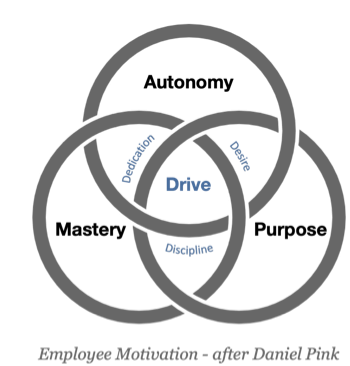All of your people need to work with autonomy, mastery and purpose.
Traditional models of motivation are driven by rewards and fear of punishment, dominated by extrinsic factors such as possible hierarchical advancement and money. This does not make for a happy and productive workplace. Higher pay only motivates those doing basic mechanical tasks.
If the task involves cognitive skills, decision-making, creativity, or higher-order thinking - as performed in many organisations– then each person in your workforce will be much better motivated if they can work with autonomy, mastery, and purpose.
Autonomy provides employees with a sense of collective ownership. They are part of a greater whole, active (rather than passive) members of the team, making a positive overall contribution to the organisation. Autonomy is motivating; motivated engineers build better products, motivated marketeers interact more keening with customers. Outcomes happen faster - decisions are made locally instead of by managers and committees.
Mastery is the inbuilt urge to improve our skills, which encourages us to participate and learn, and thereby contribute further to the quality of the outcome.
Purpose is the desire to do something that has meaning and is important. Businesses that only focus on profits without valuing purpose will end up with poor customer service and unhappy employees. If your people understand their place in the grand scheme of things, and that scheme has value and purpose, then they perform well.

Good leaders will create an organisation where everyone on the team is driven, because they can work with autonomy, mastery and purpose.
Next: Team Culture
A high-trust culture is important for creating a happy working environment and a high-performance organisation.


